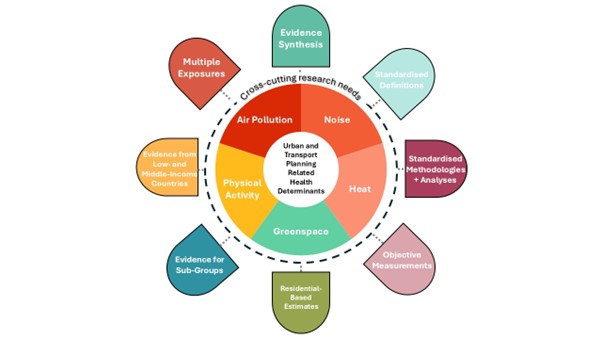The Urban Burden of Disease Estimation for Policy making (UBDPolicy) project is an EU-funded initiative aimed at enhancing the estimation of health impacts and socio-economic costs or benefits associated with air quality, noise, urban green space availability, heat and temperature, physical activity, and inequity across nearly 1,000 European cities. The project monitors three-year trends and assesses the impacts of urban and transport planning as well as environmental policies. It also seeks to advance methodological approaches and promote their adoption as best practices for urban areas, thereby strengthening evidence-based policymaking at city, national, and regional levels.
CARTEEH researcher Dr. Haneen Khreis is on the team of project partners, leading work packages, including one focused on selecting exposure and dose-response functions for policyoriented health impact assessments. On September 23 and 27, 2024, Dr. Khreis and collaborators organized a two-day workshop to discuss recent advancements, ongoing challenges, and future directions regarding exposure-response functions and their use in health impact assessments. This workshop provided a dynamic forum for an international, crossdisciplinary group committed to advancing the urban health agenda for transportation and beyond.
The list of participating organizations were: University of Cambridge, Texas A&M Transportation Institute, Barcelona Institute for Global Health, Utrecht University, University of Copenhagen, Swiss Tropical and Public Health Institute, Max Planck Institute for Chemistry, London School of Hygiene and Tropical Medicine, Queen’s University of Belfast, University of Leicester, National Research Council, Italy, Imperial College London, Air Quality Consultants LTD, Born in Bradford, Finnish Institute for Health and Welfare, Norwegian Institute of Public Health, Medical University of Plovdiv, and Netherlands National Institute for Public Health and the Environment, University of Colorado Denver, Clemson University, University of Louisville, Boston University, Columbia University, Health Effects Institute, Logicka Group, Oregon Health & Science University and the Portland State University School of Public Health, University of Arizona, University of Utah. U.S. Environmental Protection Agency and the U.K. Health Security Agency.





